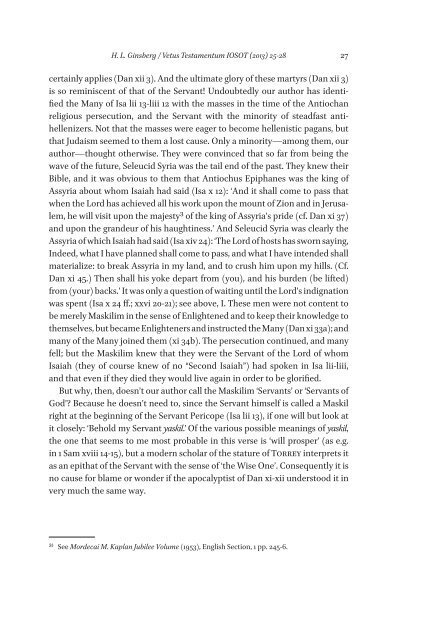Special Issue IOSOT 2013 - Books and Journals
Special Issue IOSOT 2013 - Books and Journals
Special Issue IOSOT 2013 - Books and Journals
You also want an ePaper? Increase the reach of your titles
YUMPU automatically turns print PDFs into web optimized ePapers that Google loves.
H. L. Ginsberg / Vetus Testamentum <strong>IOSOT</strong> (<strong>2013</strong>) 25-28 27<br />
certainly applies (Dan xii 3). And the ultimate glory of these martyrs (Dan xii 3)<br />
is so reminiscent of that of the Servant! Undoubtedly our author has identified<br />
the Many of Isa lii 13-liii 12 with the masses in the time of the Antiochan<br />
religious persecution, <strong>and</strong> the Servant with the minority of steadfast antihellenizers.<br />
Not that the masses were eager to become hellenistic pagans, but<br />
that Judaism seemed to them a lost cause. Only a minority—among them, our<br />
author—thought otherwise. They were convinced that so far from being the<br />
wave of the future, Seleucid Syria was the tail end of the past. They knew their<br />
Bible, <strong>and</strong> it was obvious to them that Antiochus Epiphanes was the king of<br />
Assyria about whom Isaiah had said (Isa x 12): ‘And it shall come to pass that<br />
when the Lord has achieved all his work upon the mount of Zion <strong>and</strong> in Jerusalem,<br />
he will visit upon the majesty3 of the king of Assyria’s pride (cf. Dan xi 37)<br />
<strong>and</strong> upon the gr<strong>and</strong>eur of his haughtiness.’ And Seleucid Syria was clearly the<br />
Assyria of which Isaiah had said (Isa xiv 24): ‘The Lord of hosts has sworn saying,<br />
Indeed, what I have planned shall come to pass, <strong>and</strong> what I have intended shall<br />
materialize: to break Assyria in my l<strong>and</strong>, <strong>and</strong> to crush him upon my hills. (Cf.<br />
Dan xi 45.) Then shall his yoke depart from (you), <strong>and</strong> his burden (be lifted)<br />
from (your) backs.’ It was only a question of waiting until the Lord’s indignation<br />
was spent (Isa x 24 ff.; xxvi 20-21); see above, I. These men were not content to<br />
be merely Maskilim in the sense of Enlightened <strong>and</strong> to keep their knowledge to<br />
themselves, but became Enlighteners <strong>and</strong> instructed the Many (Dan xi 33a); <strong>and</strong><br />
many of the Many joined them (xi 34b). The persecution continued, <strong>and</strong> many<br />
fell; but the Maskilim knew that they were the Servant of the Lord of whom<br />
Isaiah (they of course knew of no “Second Isaiah”) had spoken in Isa lii-liii,<br />
<strong>and</strong> that even if they died they would live again in order to be glorified.<br />
But why, then, doesn’t our author call the Maskilim ‘Servants’ or ‘Servants of<br />
God’? Because he doesn’t need to, since the Servant himself is called a Maskil<br />
right at the beginning of the Servant Pericope (Isa lii 13), if one will but look at<br />
it closely: ‘Behold my Servant yaskil.’ Of the various possible meanings of yaskil,<br />
the one that seems to me most probable in this verse is ‘will prosper’ (as e.g.<br />
in 1 Sam xviii 14-15), but a modern scholar of the stature of Torrey interprets it<br />
as an epithat of the Servant with the sense of ‘the Wise One’. Consequently it is<br />
no cause for blame or wonder if the apocalyptist of Dan xi-xii understood it in<br />
very much the same way.<br />
3) See Mordecai M. Kaplan Jubilee Volume (1953), English Section, 1 pp. 245-6.








![Am HaSefer [Volk des Buches] - Books and Journals](https://img.yumpu.com/20648352/1/174x260/am-hasefer-volk-des-buches-books-and-journals.jpg?quality=85)







